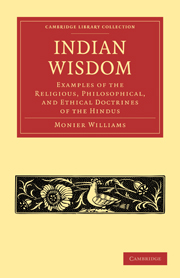Book contents
- Frontmatter
- PREFACE
- THE INDO-ROMANIC ALPHABET WITH THE EQUIVALENT SANSKṚIT LETTERS AND RULES FOR PRONUNCIATION
- Contents
- INTRODUCTION
- LECTURE I The Hymns of the Veda
- LECTURE II The Brāhmana Portion of the Veda
- LECTURE III The Systems of Philosophy
- LECTURE IV The Nyāya System of Philosophy
- LECTURE V The Sānkhya System of Philosophy
- LECTURE VI The Mimāṉsā System of Philosophy
- LECTURE VII Irregular Systems and Eclectic School
- LECTURE VIII Smṛiti. The Vedāngas
- LECTURE IX Smārta-sūtra. Gṛihya, ‘domestic rules’
- LECTURE X The Law-books. Mainu continued
- LECTURE XI Metrical Version of some of Manu's Moral and Religious Precepts
- LECTURE XII The Epic Poems
- LECTURE XIII The Mahā-bhārata
- LECTURE XIV The Epic Poems compared together and with Homer
- LECTURE XV The Artificial Poems
- INDEX
- ADDITIONS AND CORRECTIONS
- ORIENTAL WORKS
LECTURE IX - Smārta-sūtra. Gṛihya, ‘domestic rules’
Published online by Cambridge University Press: 29 August 2010
- Frontmatter
- PREFACE
- THE INDO-ROMANIC ALPHABET WITH THE EQUIVALENT SANSKṚIT LETTERS AND RULES FOR PRONUNCIATION
- Contents
- INTRODUCTION
- LECTURE I The Hymns of the Veda
- LECTURE II The Brāhmana Portion of the Veda
- LECTURE III The Systems of Philosophy
- LECTURE IV The Nyāya System of Philosophy
- LECTURE V The Sānkhya System of Philosophy
- LECTURE VI The Mimāṉsā System of Philosophy
- LECTURE VII Irregular Systems and Eclectic School
- LECTURE VIII Smṛiti. The Vedāngas
- LECTURE IX Smārta-sūtra. Gṛihya, ‘domestic rules’
- LECTURE X The Law-books. Mainu continued
- LECTURE XI Metrical Version of some of Manu's Moral and Religious Precepts
- LECTURE XII The Epic Poems
- LECTURE XIII The Mahā-bhārata
- LECTURE XIV The Epic Poems compared together and with Homer
- LECTURE XV The Artificial Poems
- INDEX
- ADDITIONS AND CORRECTIONS
- ORIENTAL WORKS
Summary
IN our classification of Smṛiti or Post-vedic literature, at the commencement of the last Lecture, we placed the Smārta Sūtras under the second head, and pointed out that they were to a great extent the source of the subsequent law-books which form, in our arrangement, the third head of Smṛiti. We also observed that the term Smārta-sūtra is a general expression for collections of aphoristic rules which are distinguished from the Ṥrautasūtra of the Kalpa Vedānga, because they do not relate to Ṥrauta or Vedic ceremonies, but rather to Gṛihya or ‘domestic rites’ and Samayāćāra or ‘conventional everyday practices.’ Hence the Smarta Sūtras are commonly subdivided into, a. Gṛihya Sūtras, and b. Sāmayāćārika Sūtras. It will be desirable, therefore, before commencing our survey of Manu's celebrated Law-book, to advert briefly to these sources from which some of its materials were derived, and especially to the Gṛihya Sūtras. Of these there are collections of different schools attached to each Veda. Thus to the Rig-veda belong the Āśvalāyaṇa and Ṥānkhāyaṇa Gṛihya Sūtras; to the Sāma-veda those of Gobhila; to the Vājasaneyi-saṃhitā or White Yajurveda those of Pāraskara; to the Taittirīya or Black Yajurveda those of Kāṭhaka, Baudhāyaṇa, Bhāradvāja, Āpastamba, the Maitrāyaṇīya, Mānava (which last have perished, though some of their Kalpa-sūtras have been preserved, see p. 213), &c.
In fact, every Brāhmanical family or school (ćaraṇa) had probably its own traditional recension (śākhā, p. 161) of the Mantra and Brāhmaṇa portion of the Vedas as well as its own Kalpa, Gṛihya, and Sāmayāćārika Sūtras; and even at the present day the domestic rites of particular families of Brāhmans are performed in accordance with the Sūtras of the Veda of which they happen to be adherents.
- Type
- Chapter
- Information
- Indian WisdomExamples of the Religious, Philosophical, and Ethical Doctrines of the Hindus, pp. 195 - 220Publisher: Cambridge University PressPrint publication year: 2010First published in: 1875

